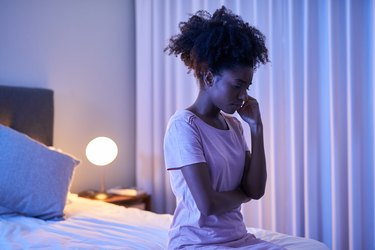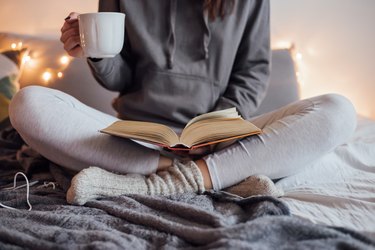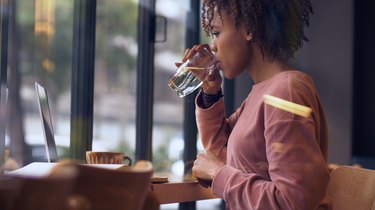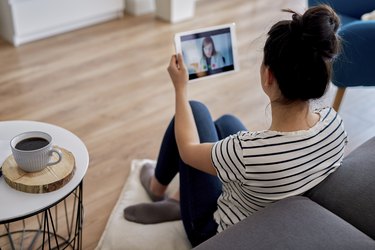
Insomnia — that is, having trouble falling or staying asleep — is nothing new in America. But the pandemic has brought on a new wave of the condition. In fact, since the COVID-19 crisis started, sleep doctors have seen an increase in insomnia and other sleep disorders, a surge that's being called "coronasomnia."
"This phenomenon doesn't refer only to people recovering from COVID-19, but also to a larger number of people whose lives have been turned upside down by fear about getting the virus, concerns about loved ones, not being able to work and social isolation," says Ioannis Koutsourelakis, MD, PhD, an ear, nose and throat surgeon who specializes in sleep medicine and Goodpath Associate's Medical Director of Sleep.
Video of the Day
Video of the Day
Between February 16 and March 15, 2020, there was a nearly 15 percent increase in prescriptions filled for sleep medication in the U.S., per April 2020 research by Express Scripts, which suggests that more people are struggling with sleep during the pandemic than were previously, notes Dr. Koutsourelakis.
Get tips on how to stay healthy, safe and sane during the novel coronavirus pandemic.
Who Is Most at Risk for Coronasomnia?
While anyone can fall victim to insomnia, especially during the pandemic, those most vulnerable are people experiencing excessive stress and anxiety, notes Dr. Koutsourelakis.
"These are people who already have medical and/or psychiatric problems (e.g. painful musculoskeletal conditions or depression), as well as people who have poor interpersonal relationships with family and friends," he says. "Lastly, people whose socioeconomic status is not optimal (e.g. unemployed or underemployed) are more prone to getting coronasomnia."
Working remotely may also upend schedules and routine in a way that leads to insomnia. For example, in a survey done of 2,300 health care workers during the height of the pandemic in spring 2020, less time with patients was associated with an increased rate of insomnia, according to results in April 2021 in the Journal of Clinical Sleep Medicine. "We hypothesize that trying to work from home at the same time that schoolchildren had been sent home to be supervised by their parents for online learning was a significant stress contributing to acute insomnia disorder," wrote the researchers.
The good news is that there are several ways to ease the symptoms of coronasomnia if you're dealing with the condition. Here are some expert tips for how to cope with, relieve and treat coronasomnia.
1. Create a Consistent Bedtime Routine

Few of us are carrying on with the same daily routine as we were prior to the pandemic, and most of us are not going to bed or waking up at the same times as we used to, notes Michael Breus, PhD, a clinical psychologist and author of Good Night. This has thrown off our body's internal clock, also known as our circadian rhythm.
"Before COVID, the only thing that was variable about sleep was your bedtime, and most people woke up at the same time each morning to go to work or deal with their kids," he says. "Now with COVID, people are not being consistent with their morning wake-up time, so all of their rhythms are off, which affects their quality of sleep, their mood and their energy."
Jacob Teitelbaum. MD, a board-certified internist and expert on chronic fatigue syndrome, recommends creating a bedtime routine for yourself, just as you would for your children.
"This means nothing stressful in the hour before bedtime — no paying bills or watching the news networks," he says. "Instead, do something calming, like soak in a hot bath with 2 cups of Epsom salts and a few drops of lavender oil after lighting some candles."
Related Reading
2. Put a Cap on Caffeine
You probably already know that caffeine can affect your sleep — especially within a certain window before bedtime (which is different for everyone).
The National Sleep Foundation recommends getting no more than 200 milligrams (about two cups of home-brewed coffee) of caffeine per day and nixing it several hours before bedtime.
Breus says timing is everything.
"Upon awakening, your natural energy is very powerful, so adding a stimulant like caffeine to the mix will make little difference," he says. "However, if you wait 90 minutes when these hormones naturally decline and then have your caffeine, it is far more effective."
He recommends cutting yourself off by 2 p.m. at the latest latest to ensure it doesn't affect your quality of sleep.
3. Cut Back on Alcohol

Since the pandemic began, there's been a significant increase in alcohol consumption in the United States, per a September 2020 study in JAMA Network Open. And a report by Nielsen showed that national sales of alcohol had increased 54 percent for the week of March 21, 2020 compared to the year before.
"Alcohol is not good for sleep, especially during a pandemic, because it affects our immune function," Breus says. "Alcohol reduces the amount of stages 3 and 4 sleep that you get (your most physically restorative sleep stages) dramatically and it dehydrates you, which affects your body's ability to also get into deep sleep."
Because it takes the average person one hour to metabolize a single alcoholic beverage, he recommends limiting your intake to one beer or glass of wine, waiting one hour before bed, and drinking one glass of water. "If you have two glasses of wine, wait two hours, drink two glasses of water and that's where I would stop," he adds.
Related Reading
4. Set Limits on Screen Time
Screen time has been linked to insomnia symptoms, per a June 2018 study by the American Academy of Sleep Medicine.
"Less screen time means more sleep time, and more sleep means easier days during a very challenging time," says Lisa Medalie, PsyD, insomnia specialist, director of the Insomnia Program at the University of Chicago, co-author of Putting Sleep Problems to Bed and founder of DrLullaby.
She recommends adults turn off all devices an hour before bedtime and have one hour of "screen-free" time each night.
"For kids, tie bedtime screen removal with earned screen time the next day," she says. "The trick is you have to be firm, so set a 5-minute timer and stick to the next day removal so they know you mean business!"
5. Seek Help for Mental Health Issues

A September 2020 survey in JAMA Network Open found that the prevalence of depression symptoms was more than three times higher during the pandemic than before, and that people with lower incomes were more at risk for these symptoms.
Plus, results from the American Psychological Association's Stress in America 2020 survey showed that general stress levels were up significantly compared to the past.
Both depression and stress, as well as its cousin anxiety, are linked to chronic insomnia, per the Anxiety & Depression Association of America.
Along with sleep issues, other symptoms of depression include feelings of sadness, tiredness and lack of energy, loss of interest in most normal activities and trouble thinking or concentrating, per the Mayo Clinic.
Other signs of anxiety include feeling restless or on edge, difficulty concentrating, irritability and difficulty controlling feelings of worry, according to the National Institute of Mental Health.
If you or someone you love is grappling with mental health issues, consider getting help immediately. Visit the National Alliance on Mental Illness (NAMI) for a list of resources and information about how to seek help for mental health during the pandemic.
Related Reading
Concerned About COVID-19?
Read more stories to help you navigate the novel coronavirus pandemic:
- Express Scripts: "American's State of Mind"
- JAMA Network Open: "Prevalence of Depression Symptoms in US Adults Before and During the COVID-19 Pandemic"
- American Psychological Association: "Stress in America 2020"
- Anxiety & Depression Association of America: "Sleep Disorders"
- National Alliance on Mental Illness: "COVID-19 Resource and Information Guide"
- National Sleep Foundation: "Caffeine and Sleep"
- JAMA Network Open: "Changes in Adult Alcohol Use and Consequences During the COVID-19 Pandemic in the US"
- Nielsen: "Rebalancing the ‘COVID-19 effect’ on alcohol sales"
- American Academy of Sleep Medicine: "Study links screen time to insomnia symptoms and depressive symptoms in adolescents"
- Mayo Clinic: "Depression (major depressive disorder)"
- National Institute of Mental Health: "Anxiety Disorders"
- Journal of Clinical Sleep Medicine: "Short-term insomnia disorder in health care workers in an academic medical center before and during COVID-19: rates and predictive factors"
Is this an emergency? If you are experiencing serious medical symptoms, please see the National Library of Medicine’s list of signs you need emergency medical attention or call 911.